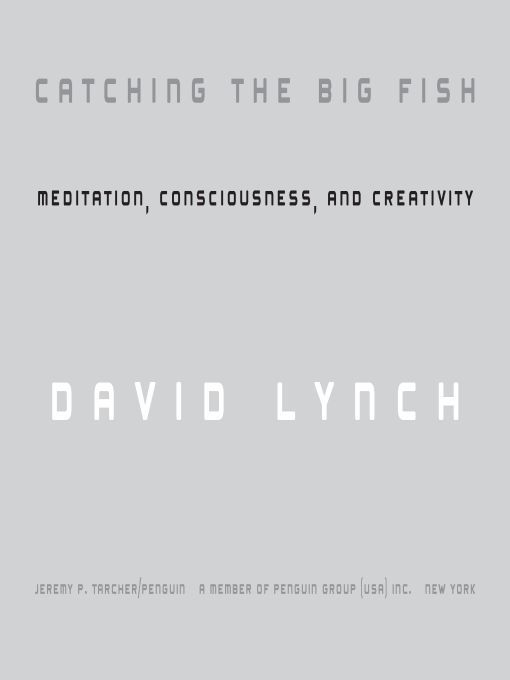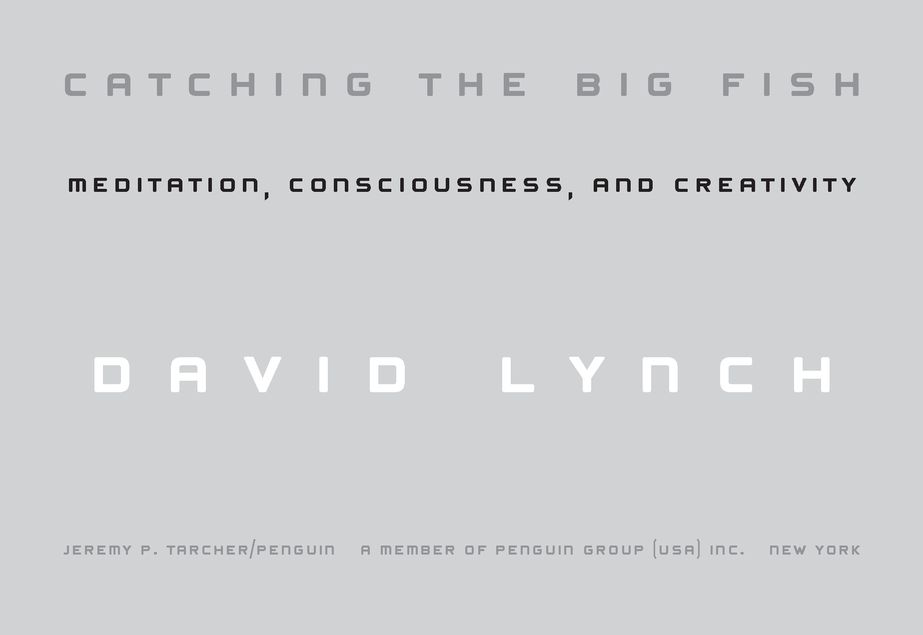Catching the Big Fish
Read Catching the Big Fish Online
Authors: David Lynch


Table of Contents

JEREMY P. TARCHER/PENGUIN
Published by the Penguin Group
Penguin Group (USA) Inc., 375 Hudson Street, New York, New York 10014, USA • Penguin Group (Canada),
90 Eglinton Avenue East, Suite 700,Toronto, Ontario M4P 2Y3, Canada (a division of Pearson Penguin Canada Inc.)
Penguin Books Ltd, 80 Strand, London WC2R 0RL, England • Penguin Ireland, 25 St Stephen’s Green, Dublin 2,
Ireland (a division of Penguin Books Ltd) • Penguin Group (Australia), 250 Camberwell Road, Camberwell,Victoria 3124,
Australia (a division of Pearson Australia Group Pty Ltd) • Penguin Books India Pvt Ltd, 11 Community Centre,
Panchsheel Park, New Delhi-110 017, India • Penguin Group (NZ), 67 Apollo Drive, Rosedale, North Shore 0632,
New Zealand (a division of Pearson New Zealand Ltd) • Penguin Books (South Africa) (Pty) Ltd,
24 Sturdee Avenue, Rosebank, Johannesburg 2196, South Africa
Penguin Books Ltd, Registered Offices: 80 Strand, London WC2R 0RL, England
Published by the Penguin Group
Penguin Group (USA) Inc., 375 Hudson Street, New York, New York 10014, USA • Penguin Group (Canada),
90 Eglinton Avenue East, Suite 700,Toronto, Ontario M4P 2Y3, Canada (a division of Pearson Penguin Canada Inc.)
Penguin Books Ltd, 80 Strand, London WC2R 0RL, England • Penguin Ireland, 25 St Stephen’s Green, Dublin 2,
Ireland (a division of Penguin Books Ltd) • Penguin Group (Australia), 250 Camberwell Road, Camberwell,Victoria 3124,
Australia (a division of Pearson Australia Group Pty Ltd) • Penguin Books India Pvt Ltd, 11 Community Centre,
Panchsheel Park, New Delhi-110 017, India • Penguin Group (NZ), 67 Apollo Drive, Rosedale, North Shore 0632,
New Zealand (a division of Pearson New Zealand Ltd) • Penguin Books (South Africa) (Pty) Ltd,
24 Sturdee Avenue, Rosebank, Johannesburg 2196, South Africa
Penguin Books Ltd, Registered Offices: 80 Strand, London WC2R 0RL, England
First trade paperback edition 2007
Copyright © 2006 by Bobkind, Inc.
All rights reserved. No part of this book may be reproduced, scanned, or distributed in any
printed or electronic form without permission. Please do not participate in or encourage piracy
of copyrighted materials in violation of the author’s rights. Purchase only authorized editions.
Published simultaneously in Canada
printed or electronic form without permission. Please do not participate in or encourage piracy
of copyrighted materials in violation of the author’s rights. Purchase only authorized editions.
Published simultaneously in Canada
Most Tarcher/Penguin books are available at special quantity discounts for bulk purchase for sales promotions, premiums, fund-raising, and educational needs. Special books or book excerpts also can be created to fit specific needs. For details, write Penguin Group (USA) Inc. Special Markets, 375 Hudson Street, New York, NY 10014.
eISBN : 978-1-101-04330-1
1. Transcendental Meditation. 2. Creative ability—Religious aspects.
3. Creation (Literary, artistic, etc.). I.Title.
BF637.T68L
158.1’25—dc22
3. Creation (Literary, artistic, etc.). I.Title.
BF637.T68L
158.1’25—dc22
This book is printed on acid-free paper.


While the author has made every effort to provide accurate telephone numbers and Internet addresses at the time of publication, neither the publisher nor the author assumes any responsibility for errors, or for changes that occur after publication. Further, the publisher does not have any control over and does not assume any responsibility for author or third-party websites or their content.
To His Holiness Maharishi Mahesh Yogi
INTRODUCTION
Ideas are like fish.
If you want to catch little fish, you can stay in the shallow water. But if you want to catch the big fish, you’ve got to go deeper.
Down deep, the fish are more powerful and more pure.They’re huge and abstract. And they’re very beautiful.
I look for a certain kind of fish that is important to me, one that can translate to cinema. But there are all kinds of fish swimming down there. There are fish for business, fish for sports.There are fish for everything.
Everything, anything that is a thing, comes up from the deepest level. Modern physics calls that level the Unified Field. The more your consciousness—your awareness—is expanded, the deeper you go toward this source, and the bigger the fish you can catch.
My thirty-three-year practice of the Transcendental Meditation program has been central to my work in film and painting and to all areas of my life. For me it has been the way to dive deeper in search of the big fish. In this book, I want to share some of those experiences with you.
THE FIRST DIVE
BHAGAVAD-GITA
When I first heard about meditation, I had zero interest in it. I wasn’t even curious. It sounded like a waste of time.
What got me interested, though, was the phrase “true happiness lies within.” At first I thought it sounded kind of mean, because it doesn’t tell you where the “within” is, or how to get there. But still it had a ring of truth. And I began to think that maybe meditation was a way to go within.
I looked into meditation, asked some questions, and started contemplating different forms. At that moment, my sister called and said she had been doing Transcendental Meditation for six months.There was something in her voice. A change. A quality of happiness. And I thought,
That’s what I want.
That’s what I want.
So in July 1973 I went to the TM center in Los Angeles and met an instructor, and I liked her. She looked like Doris Day. And she taught me this technique. She gave me a mantra, which is a sound-vibration-thought. You don’t meditate on the meaning of it, but it’s a very specific sound-vibration-thought.
She took me into a little room to have my first meditation. I sat down, closed my eyes, started this mantra, and it was as if I were in an elevator and the cable had been cut. Boom! I fell into bliss—pure bliss. And I was just
in
there. Then the teacher said, “It’s time to come out; it’s been twenty minutes.” And I said,“IT’S ALREADY BEEN TWENTY MINUTES?!” And she said, “Shhhh!” because other people were meditating. It seemed so familiar, but also so new and powerful. After that, I said the word “unique” should be reserved for this experience.
in
there. Then the teacher said, “It’s time to come out; it’s been twenty minutes.” And I said,“IT’S ALREADY BEEN TWENTY MINUTES?!” And she said, “Shhhh!” because other people were meditating. It seemed so familiar, but also so new and powerful. After that, I said the word “unique” should be reserved for this experience.
It takes you to an ocean of pure consciousness, pure knowingness. But it’s familiar; it’s
you.
And right away a sense of happiness emerges—not a goofball happiness, but a thick beauty.
you.
And right away a sense of happiness emerges—not a goofball happiness, but a thick beauty.
I have never missed a meditation in thirty-three years. I meditate once in the morning and again in the afternoon, for about twenty minutes each time.Then I go about the business of my day. And I find that the joy of doing increases. Intuition increases. The pleasure of life grows. And negativity recedes.
SUFFOCATING RUBBER CLOWN SUIT
When I started meditating, I was filled with anxieties and fears. I felt a sense of depression and anger.
I often took out this anger on my first wife. After I had been meditating for about two weeks, she came to me and said, “What’s going on?” I was quiet for a moment. But finally I said, “What do you mean?” And she said, “This anger, where did it go?” And I hadn’t even realized that it had lifted.
I call that depression and anger the Suffocating Rubber Clown Suit of Negativity. It’s
suffocating,
and that rubber
stinks.
But once you start meditating and diving within, the clown suit starts to dissolve. You finally realize how putrid was the stink when it starts to go.Then, when it dissolves, you have freedom.
suffocating,
and that rubber
stinks.
But once you start meditating and diving within, the clown suit starts to dissolve. You finally realize how putrid was the stink when it starts to go.Then, when it dissolves, you have freedom.
Anger and depression and sorrow are beautiful things in a story, but they’re like poison to the filmmaker or artist. They’re like a vise grip on creativity. If you’re in that grip, you can hardly get out of bed, much less experience the flow of creativity and ideas. You must have clarity to create. You have to be able to catch ideas.
STARTING OUT
I started out just as a regular person, growing up in the Northwest. My father was a research scientist for the Department of Agriculture, studying trees. So I was in the woods a lot. And the woods for a child are magical. I lived in what people call small towns. My world was what would be considered about a city block, maybe two blocks. Everything occurred in that space. All the dreaming, all my friends existed in that small world. But to me it seemed so huge and magical. There was plenty of time available to dream and be with friends.
Other books
The Considine Curse by Gareth P. Jones
With or Without You by Alison Tyler
Dying to Forget by Trish Marie Dawson
The King's Secret Matter by Jean Plaidy
Las canicas, las «cuquis» y el novio tontito de Mamá by Alfonso Ussia
1014: Brian Boru & the Battle for Ireland by Morgan Llywelyn
Strong Signal (Cyberlove #1) by Megan Erickson, Santino Hassell
The Elysium Commission by L. E. Modesitt, Jr.
Impossible Things by McBrayer, Alexandra
Hollywood Sinners by Victoria Fox